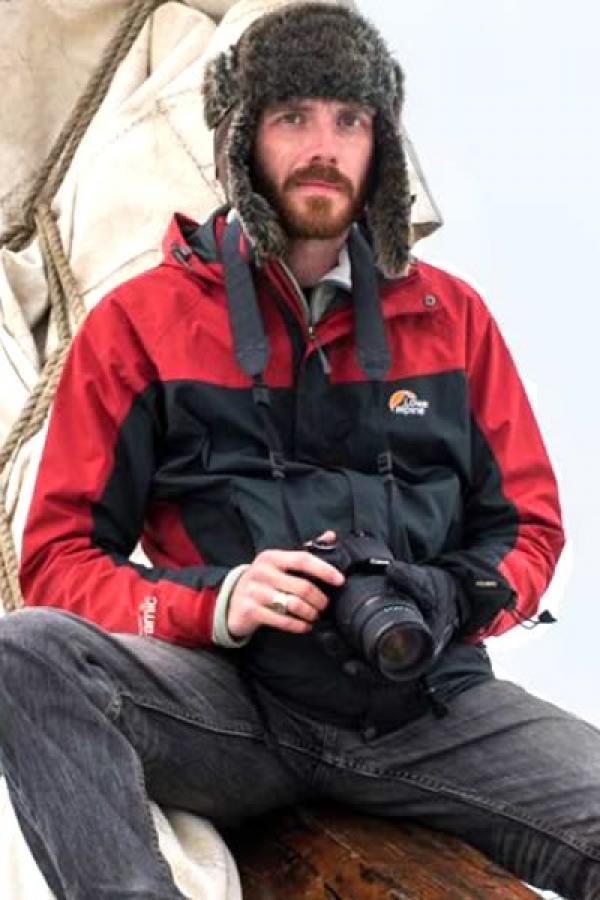Alexander Lumans

Photo by Ashley Jordan Gordon
Bio
Alexander Lumans was the Spring 2014 Philip Roth Resident at Bucknell University. He was also awarded a fellowship to the 2015 Arctic Circle Residency, where he sailed around Svalbard, Norway in a tall ship. His fiction has appeared in Gulf Coast, TriQuarterly, Story Quarterly, American Short Fiction, and Cincinnati Review, among others. He has been awarded fellowships to MacDowell, Yaddo, VCCA, Brush Creek, and Blue Mountain Center as well as scholarships to Sewanee and Bread Loaf. He received the 2015 Wabash Fiction Prize from Sycamore Review, the 2013 Gulf Coast Fiction Prize, and the 2011 Barry Hannah Fiction Prize from Yalobusha Review. He graduated from the MFA Fiction Program at Southern Illinois University Carbondale and now teaches at University of Colorado Denver.
Once I received the call informing me that I’d received an NEA grant, I immediately knew it would be a game-changer for my writing career. In a year of feeling frustrated and concerned about my work and my future, I suddenly felt like some feral cat receiving a newly minted tenth life. I know this award does not necessarily define a career; however, I firmly believe it will open doors I did not know previously existed. Even tiny doors. Especially tiny doors—they’re the ones that usually lead to brand new dimensions.
Receiving this award will grant me, most specifically, the opportunity to finish my current novel. It will significantly assist in funding my research travel to Norway and the Arctic Circle; moreover, it will allow me to scale back in future teaching responsibilities in order to devote much more time to the writing itself. I would also be remiss if I didn’t mention the extreme vote of confidence this award has instilled in me. For all these reasons and more, I’m deeply indebted to the NEA for such a boon to my creative endeavors. A tenth life!
Excerpt from "Bullet O’clock"
Someone has been slipping bullets into the pockets of our children. More specifically: spent shells. Even more specifically: Spitzer hollow points, red Mossbergs, even .30 cal boat-tail Sierra MatchKings. None are missing from our gun cabinets and no stores have had a problem with theft. We ask our children, and they say they don’t know. Then they return their focus to the living room rug, to the Operation at hand—extracting a plastic white butterfly out of a cardboard patient’s body without the electric sides going off. “I don’t know” is all the answer we need.
We drive everywhere, looking for clues. We don’t know what to keep our ears and eyeballs out for besides “ZEEERO!”and hajis playing dead on the side of the road. Since we returned home months ago, after more than a year of serving FOB infantry in the Second Gulf War, we don’t know a lot. Like why our one traffic signal cannot stay fixed. Or why there’s a new downtown fountain of three scary bronzed kids and a newly elected sheriff who hasn’t done anything about these recent crimes. Or why our wives, who have only gotten more beautiful in our absence, will now let us do whatever we want in the sack; yet, the way they look at us from across the living room where we can sit for hours without saying a word, we feel like foreign invaders in their husbands’ bodies.
So that we can put our finger on something, we start with our children. All of our children—their pictures in our wallets, our breath in their lungs—are potential victims.
“Victims?” our wives ask.
“Victims of heinous crimes,” we say.
“Crimes, perhaps, but heinous? That is too far.”
“Try odious,” one of us says.
“Scandalous?” another one of us says.
“Monstrously, horrendously atrocious,” one more of us says.
“Take your picks,” we say. “You’re all on our side.”
Our wives back slowly out of the room.
Looking at us, you may not think control is a priority: we were once combine drivers and hogmen and lazy fry cooks. Our eyes the same blue as our trucks. Our hair high and tight. Our underwear boxer-briefs, standard-issue white. Our favorite band Creedence Clearwater Revival and our favorite song “Long As I Can See the Light.” We only drive domestic manuals, playing this song at a volume level that draws looks from horses and the elderly alike. At all times we carry a seven-inch K-BAR on our person. In the backyard we keep watch over our children running around, dancing, pretending they are giant butterflies. Our children ask us: if we could be any animal, what would we be?
We would be the desert itself, scorched and sleepless.
("Bullet O'clock" was previously published in Sycamore Review)

